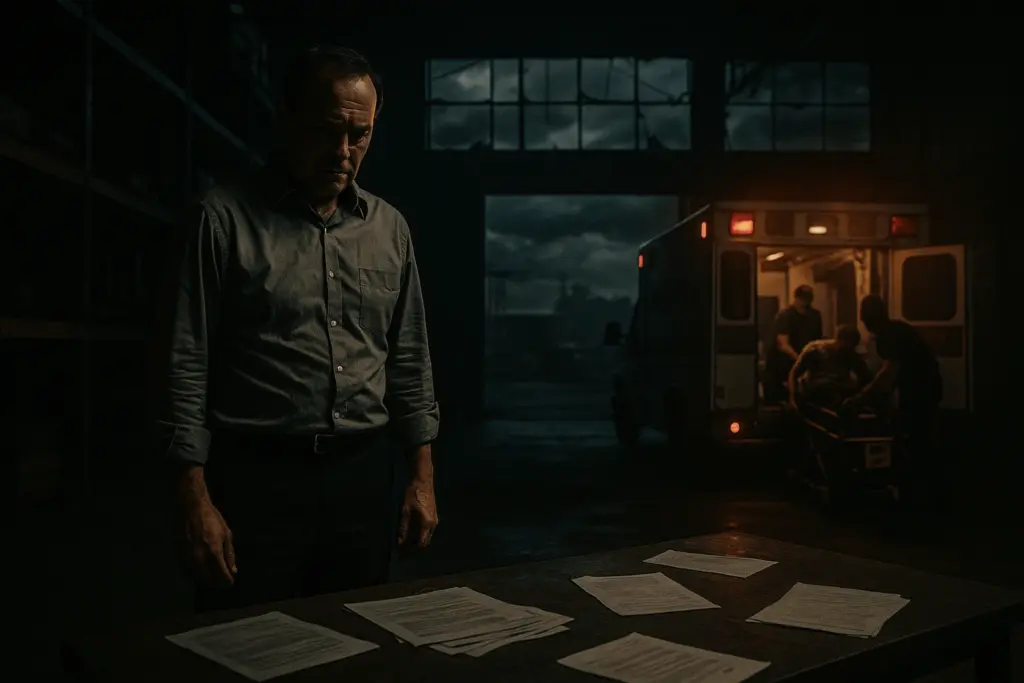The Myth That Cost Him Thousands

Brian thought he had everything under control, tight crew, safe workspace, no drama. Like a lot of business owners, he brushed off what he saw as just another expense. “We don’t do anything dangerous. Workers comp? Not for us.” But when one of his guys slipped on a wet step and cracked his wrist, that decision came back hard. The medical bills and missed work turned into a $28,000 problem overnight.
Brian isn’t reckless, he just believed one of the most common workers comp insurance myths out there. And he’s far from alone.
If you own a small business, chances are you’ve heard at least a few of these. Maybe you even believe some of them yourself. But these myths don’t just float around harmlessly, they leave you wide open to lawsuits, audits, and surprise costs that can gut your bottom line.
In this post, we’re going to break down the top five workers comp insurance myths that too many business owners still believe, and show you what’s really at stake.
Workers Comp Insurance Myths: Is It Just for Construction and Factories?
When Sarah opened her boutique, workers comp wasn’t even on her radar. “We’re just a retail shop. No heavy equipment. No ladders. What could possibly go wrong?” she thought. But when her assistant tripped over a box in the back room and tore a ligament, that quick judgment cost Sarah months of stress and a bill she hadn’t budgeted for.
This is one of the most widespread workers comp insurance myths, that it only applies to jobs with obvious physical risks, like roofing, plumbing, or factory work.
But here’s the truth: injuries can, and do, happen in every type of workplace.
Think about your team.
- A front desk employee who slips on a wet floor
- A delivery driver injured in a fender bender
- A cashier with chronic wrist pain from repetitive scanning
- Even a remote worker who throws out their back moving a chair
These aren’t freak accidents. They’re the kind of claims that happen every single day to businesses that don’t think they’re risky.
And if you’re uninsured when something happens? You’re not just on the hook for medical bills. You could be responsible for lost wages, legal costs, and potential penalties from the state if coverage was required.
One small incident can turn into a five-figure financial hit, fast.
This myth sticks because it feels logical. If you’re not running a dangerous operation, why would you need workers comp? But the law doesn’t look at your feelings. It looks at whether your business has employees, and whether you’re prepared for the unexpected.
If you’re still operating under this or any other workers comp insurance myths, you’re not protecting your team, or your business, the way you think you are.
One of the Costliest Workers Comp Insurance Myths: 1099s Don’t Count
Jake ran a small landscaping business with a tight crew and even tighter margins. To keep costs down, he paid his team as 1099 contractors. “They’re not employees,” he figured. “So I don’t need workers comp.” But when one of his guys threw out his back lifting heavy stone and filed a claim with the state, Jake got hit with something worse than a bill, a full-blown audit.
This is one of the trickiest workers comp insurance myths out there:
If you pay someone as a contractor, you’re not responsible.
But that’s not how most states see it.
Workers comp laws don’t just go by the title on a tax form. They look at the nature of the relationship.
Ask yourself:
- Do you control how, when, and where the person works?
- Are they using your tools or equipment?
- Do they only work for you and not other clients?
If the answer is yes, the state may consider that person an employee, no matter what it says on their contract.
And if that person gets hurt? You could be held responsible for medical expenses, lost wages, and fines for failing to carry coverage. Some states even back-charge premiums for previous years if they decide the worker was misclassified all along.
Jake thought he was playing it smart. He wasn’t cutting corners, he just didn’t know the rules. But that misunderstanding opened him up to thousands in unexpected costs.
Don’t fall into the same trap. Misclassifying workers is one of the most expensive workers comp insurance myths a business owner can believe.
If you’re using contractors, it pays to double-check how your state defines that relationship. Because if the state decides you got it wrong, you’ll be the one picking up the tab.
Workers Comp Insurance Myths That Ignore State Laws
Tina owned a small bakery with just two part-time helpers and her cousin on weekends. Business was steady, not booming. So when she heard about workers comp insurance, she shrugged it off. “We’re not big enough yet,” she told her accountant. “I’ll get to it once we grow.” But when a state inspector showed up after a minor injury report, Tina found herself facing fines, back payments, and a serious headache she didn’t see coming.
This is one of the most dangerous workers comp insurance myths out there:
“I don’t need it until I hire a bunch of people.”
Here’s the problem, size has nothing to do with it.
Every state has its own rules. In some, even one part-time employee triggers a legal requirement to carry coverage. Others set the bar at two, three, or five. It’s not based on hours worked or job title. It’s based on whether you have people on payroll, or even working under your direction.
And “waiting until you grow” isn’t just risky, it can cost you more than the policy ever would.
If the state finds you noncompliant:
- You can be fined daily, sometimes up to $1,000 or more
- You may be liable for the full cost of an injury out of pocket
- In some cases, you could even face criminal charges
Tina didn’t mean to cut corners. She just didn’t realize how strict the laws were. That’s exactly how these workers comp insurance myths catch up with good business owners.
Here’s the bottom line: whether you’ve got one helper or a full crew, you need to know what your state requires. Guessing wrong, or waiting too long, can come back to bite hard.
Two Dangerous Workers Comp Insurance Myths That Could Bankrupt You
Marcus had owned his auto repair shop for over a decade. Not once had he filed a workers comp claim. “It’s just part of doing business,” he’d say. “You pay it, but you’ll probably never use it. And if something ever happens, the insurance will handle it.” It wasn’t until his lead tech injured his back on the job that Marcus learned two hard truths: not all claims are simple, and not all policies pay out the way you think they will.
Let’s bust two workers comp insurance myths that often go hand in hand:
Myth #4: “Claims Are Rare”
Many business owners believe that because nothing has gone wrong yet, it probably never will. But that’s a risky assumption.
Just because you’ve been lucky so far doesn’t mean you’re immune. Injuries can happen in a second, from a misplaced box to a strained shoulder during routine work.
The most common claims aren’t dramatic, they’re slips, trips, repetitive stress, and overexertion. Quiet, everyday risks.
Myth #5: “Insurance Always Pays Out”
This one can sting. You pay your premiums, so if something happens, it should be covered, right? Not always.
Here’s why claims get denied:
- Delayed reporting
- Missing documentation
- Lapsed or incomplete coverage
- Employees not officially listed on the policy
In Marcus’s case, he didn’t realize his updated payroll hadn’t been reflected on his policy. The claim was delayed for months, and he ended up covering part of the cost himself.
The truth is, workers comp only works if your coverage is set up correctly, and if you’re following the rules when a claim happens.
These workers comp insurance myths create a false sense of security. And that false confidence can lead to massive financial consequences when something does go wrong.
Don’t assume you’re covered just because you’ve been claim-free. Take the time to understand how your policy actually works, and make sure it’s built to respond when you need it most.
What You Don’t Know Can Hurt You
Brian, Sarah, Jake, Tina, and Marcus didn’t set out to cut corners, they just believed what they’d heard. Like so many business owners, they were juggling too much and relying on assumptions instead of facts. But as you’ve seen, those small misunderstandings around workers comp can carry big consequences.
These workers comp insurance myths don’t just lead to confusion, they create costly blind spots that can wreck your finances and reputation when something goes wrong. The good news? You don’t have to figure it out alone.
If you’re questioning what’s actually covered, or whether your current setup is leaving you exposed, now’s the time to get clarity. Take five minutes and get a second look at your policy. Because real protection doesn’t come from guesswork, it comes from knowing the rules and working with someone who tells it to you straight.
Learn what’s covered, what’s not, and how to protect your business properly with Workers Compensation Insurance that’s built for real-world situations.
